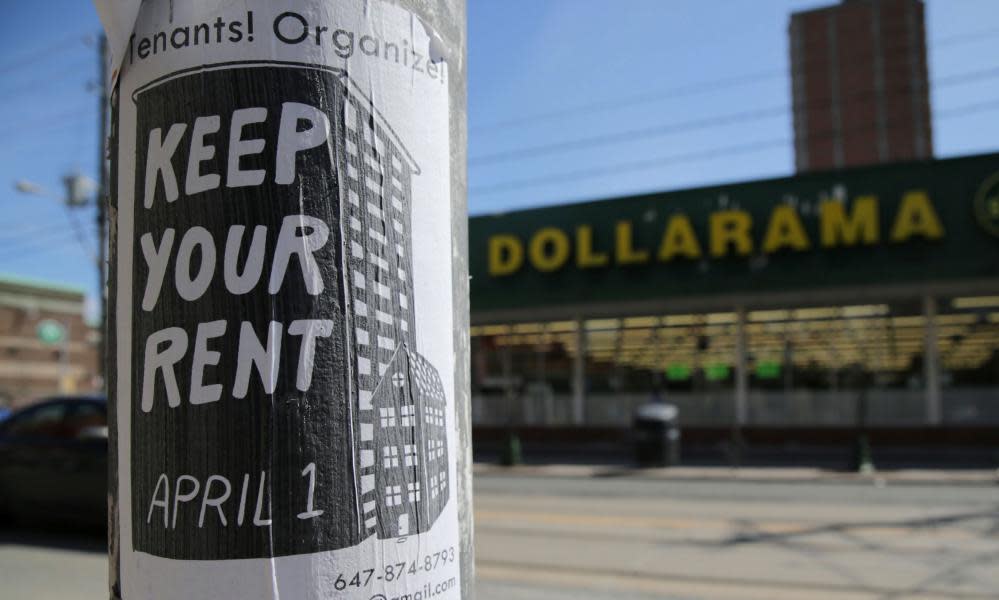Landlords on the pandemic: 'Everyone has an impression of us as rich and greedy'

The coronavirus pandemic has brought mass unemployment . To prevent a spate of homelessness, governors across the US have promised moratoriums on evictions, and mortgage forgiveness for those who can’t keep up with their payments. But many renters say the protections do not go far enough, and some are threatening rent strikes.
Related: Coronavirus US live: Cuomo says New York cases 'coming down' but warns against rush to reopen
Ricardo Reis, who owns 16 properties in Michigan, says there is a stigma against landlords, which means people are less empathetic about their needs during such times.
“Everyone has an impression of us as being rich and greedy. A lot of tenants will be thinking, how can they ask [us to pay] during this time? But in reality, there are costs involved,” says Reis.
Those costs include property taxes, insurance, maintenance and mortgage payments. Although homeowners will be provided with mortgage relief during the pandemic, many renters are wondering why they should still pay rent. But plenty aren’t aware that commercial property owners – landlords, in other words – are not entitled to this benefit. Furthermore, forbearance programs only defer mortgage payments, rather than completely forgiving the cost.
“They are seeing this as an opportunity, as opposed to asking for help and relief … to inflict damage on the landlord as some sort of a class warfare,” says Jay Martin, the executive director of the community housing improvement project (Chip) in New York.
Many landlords say this class-warfare view – the moneyed landlord versus the renter – is misguided. Reis, who also manages properties on behalf of a property management company, says that renters are used to a faceless landlord and don’t realize that on the other side is a family looking to pay the mortgage.
“Tenants have a misconception that landlords make a lot of money, because they think what they pay goes straight into the landlord’s pocket,” says Reis. In his state,he says most make less than what is presumed.
“In Michigan, landlords make around $200 to $300 per month for each property, after expenses are accounted for.”
He adds that the risk landlords take on is high: they take the loan , risk foreclosure if they can’t pay the mortgage, and could potentially lose everything. “It’s an extremely risky position. And as they say, with risk comes a little bit of reward … and in this case that’s dependent on their tenant making their payment on time.”
Reis believes most tenants won’t pay rent if they don’t have to, and so criticizes the government for leaving landlords with that risk by offering eviction moratoriums.
“The state is trying to put it on landlords to house individuals for free,” he says. Reis says the government “should instead bolster social housing if they believe that people should live rent-free”.
He says understands people might look at his 16 homes as a lot. But he says: “For a true real estate investor, it’s not a lot. My wife is a school teacher.”
Greg Margulies, a landlord in LA, is not worried about rent strikes. He says most people understand the consequences of not paying rent.
What could be more greedy than withholding rent that you have the ability to pay?
Jay Martin
“They’ll only band together for a very short time – until the first eviction paper comes [through]. Then I think it will hit home,” said Margulies. He owns four properties in LA and still has a mortgage on each of them, and he says his property taxes on each building costs him between $500-$1,000 per property.
While eviction moratoriums prevent them from being evicted now, in the long term, landlords still have the upper hand: “I can’t imagine most landlords are going to look favorably on renters who band together like that. I expect they will get their leases non-renewed, even if they don’t get evicted.”
Margulies empathizes with the fact that there are currently millions out of work. He stresses that most landlords want to work with tenants, to keep them in their properties, not to work against them – he has allowed one tenant who could only pay partial rent, and another who has had to defer payment.
But that sympathy can only go so far, he says. “At the same time, [they] still get to stay in the unit: you have a safe place to sleep, you’re away from the virus.
“It’s unfortunate you’re not working, but that should have nothing to do with paying for what you used. You still have to pay for gas, you still have to pay for groceries.”
Asked what message he would give to renters thinking of striking, Margulies advises them to keep in contact with their landlord. “We are not blind to what’s going on in the world – we see that the world has been turned upside down. We are willing to work with tenants, but if you ignore the landlord, thinking it’s going to go away, it’s not.”
But Reis warns that reforms such as moratoriums or rent caps, which are intended to help the tenant, will always ending up costing them as landlords cut corners to seek to make costs back.
Related: Sex during lockdown: are we witnessing a cybersexual revolution? | Ciara Gaffney
“Moratoriums sound great right now, but come fall [we will have to start changing] how we screen tenants,” he says. “It’s opened up our eyes, we realize there is just not enough security if the government can freeze rents or put a moratorium in place and just leave us stranded.”
Martin says it is the behavior of renters rather than landlords that should concern people at the moment.
“What could be more greedy than withholding rent that you have the ability to pay? [You will] damage the entire housing market, push it towards collapse. To me, it’s incredibly short-sighted.”

